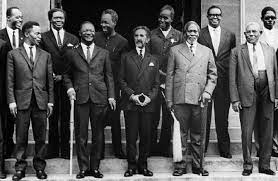Founding Fathers of African Union - ENA English
Founding Fathers of African Union

Dr. Kwame Nkrumah, the first prime minister (1957-1960) and president (1960-1966) of the Republic of Ghana, was the leader of the first sub-Saharan African nation to gain its independence. He subsequently became a leading figure in the campaign for the United States of Africa. He advocated for Pan Africanism and played a leading role in the establishment of the OAU in 1963 in Addis Ababa.
H.E Jomo Kenyatta was a leader in the Kenyan independence movement known as the Mau Mau Movement, a strong supporter of a Kenyan government controlled by native Africans, and the nation's first prime minister as well as its first president. He is one of the founders of the OAU in 1963. He helped organize the fifth Pan-African Congress, chaired by W.E.B. Du Bois, to encourage cooperation between black Africans under white rule. In this time, he adopted the name Jomo, which meant Burning Spear. In these years, Jomo Kenyatta was really born as a major political figure.
H.E Gamal Abdel Nasser Hussein (15 January 1918 – 28 September 1970) was an Egyptian politician who served as the second president of Egypt from 1954 until his death in 1970. Nasser led the 1952 overthrow of the monarchy. He became president of Egypt in 1956. He played a prominent role in the establishment of the OAU and advocated for African Unity and Pan Africanism.
H.E Léopold Sédar Senghor (9 October 1906 – 20 December 2001) was a Senegalese poet, politician and cultural theorist who, for two decades, served as the first president of Senegal (1960–80). Ideologically an African socialist, he was the major theoretician of Négritude. Senghor was also the founder of the Senegalese Democratic Bloc party. Senghor was the first African elected as a member of the Académie française. He won the 1985 International Nonino Prize in Italy. He is regarded by many as one of the most important African intellectuals of the 20th century and founder of the OAU.
H.E Apollo Milton Obote (28 December 1925 – 10 October 2005) was a Ugandan political leader who led Uganda to independence from British colonial rule in 1962. Following the nation's independence, he served as prime minister of Uganda from 1962 to 1966 and the second president of Uganda from 1966 to 1971, then again from 1980 to 1985. He was overthrown in a coup d'état 1971, but was re-elected in 1980 a year after Amin's 1979 overthrow. His second period of rule ended after a long and bloody conflict known as the Ugandan Bush War, during which he was overthrown a second time by another coup d'état in 1985, prompting him to live the rest of his life in exile.
H.E Ahmed Ben Bella was an Algerian politician, soldier, and socialist revolutionary who served as the first President of Algeria from 1963 to 1965. Ahmed Ben Bella, was the principal leader of the Algerian War of Independence against France, the first prime minister (1962–63) and first elected president.
H.E Julius Kambarage Nyerere (13 April 1922 – 14 October 1999) was a Tanzanian anti-colonial activist, politician, and political theorist.He governed Tanganyika as Prime Minister from 1961 to 1962 and then as President from 1963 to 1964, after which he led its successor state, Tanzania, as President from 1964 to 1985. He was a founding member and chair of the Tanganyika African National Union (TANU) party, and of its successor Chama Cha Mapinduzi, from 1954 to 1990. Ideologically an African nationalist and African socialist, he promoted a political philosophy known as Ujamaa.
H.E Abubakar Tefewa Belewa (December 1912 – 15 January 1966) was a Nigerian politician who served as the first and only Prime Minister of Nigeria. He played important roles in the continent's formative indigenous rule. He was an important leader in the formation of the Organization of African Unity and creating a cooperative relationship with French speaking African countries.
H.E Ahmed Sékou Touré (January 9, 1922 - March 6, 1984) was a Guinean political leader and African statesman who became the first president of Guinea, serving from 1958 until his death in 1984. Touré was among the primary Guinean nationalists involved in gaining independence of the country from France.
General Ibrahim Abboud (26 October 1900 - 8 September 1983) was a Sudanese political figure who served as the head of state of Sudan between 1958 and 1964 and as president of Sudan in 1964; however, he soon resigned, ending Sudan's first period of military rule. A career soldier, Abboud served in World War II in Egypt and Iraq In 1949, Abboud became the deputy Commander in Chief of the Sudanese military. Upon independence, Abboud became the Commander in Chief of the Military of Sudan.
Haile Selassie, original name, Tafari Makonnen was Emperor of Ethiopia (1930 to 1974). He brought Ethiopia into the League of Nations and United Nations and made Addis Ababa the major centre for the Organization of African Unity.
When Italy invaded Ethiopia in 1935, Haile Selassie led the resistance, but in May 1936 he was forced into exile. He appealed for help from the League of Nations in a memorable speech that he delivered to that body in Geneva on June 30, 1936.
Haile Selassie played a very important role in the establishment of the Organization of African Unity in 1963.